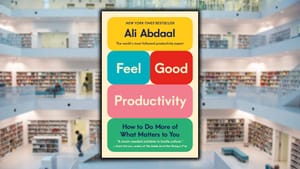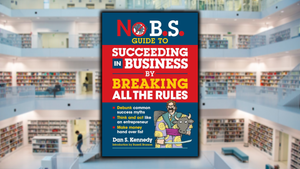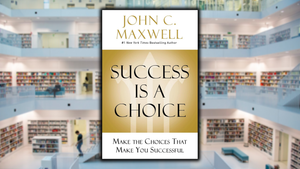
Summary:
This Book is For:
- Anyone who wants to know how the richest people in the world actually think about money and how it directs their behavior.
- Anyone who is interested in starting their own business (internet or otherwise) and who wants to get a leg up on the competition and shorten their learning curve.
- People who don't want to wait 50+ years to "maybe" get rich in the stock market just as long as everything doesn't blow up.
- Business owners who want to level up their skills, who want to scale, and who are willing to work exceptionally hard in order to make it.
"By wanting to become wealthy, you are also saying that you want to accept the challenge to be better at making money than 99 percent of the people on this planet. Just by attempting this, you are going to have to accept the fact that you must not just be good, you must be incredible."
-Alex Becker, 8-figure software entrepreneur
Most people aren't wealthy. They may or may not be struggling financially, but the average person will never become rich, and this is because it's literally impossible both to remain average and make above-average money at the same time.
You must elevate your financial game if you wish to become wealthy, and that process starts with embracing the mindsets and thinking patterns of the world's wealthiest people.
Now, obviously, there's a huge difference between a person's value to society and their value to humanity itself. Each and every individual's value to humanity is literally infinite - there are no "extra" people on this planet. But your value to society is what directly affects what you get paid, and the amount of wealth you can accrue in your lifetime.
If you want to be rich, you must make yourself exceptionally valuable to society.
Alex Becker, the multimillionaire CEO of HYROS is uniquely suited to teach you about the mindsets and business tactics of the world's wealthiest people, because, well, he is one! He's built several successful businesses and grown them to multimillion-dollar valuations and he's done all this without taking on any outside investment or funding.
All he had when he left the US Air Force was about $6,000 in savings and a burning desire to be successful in business. He also possessed a voracious appetite for learning, and the humility to accept that there was still an incredible amount that he had to learn if he wanted to reach his business goals.
He also realized that if you wish to separate yourself from the statistics, you can't take money advice from poor people! Everyone has an opinion about "how to get rich," but you always have to look at the credibility of your sources. Are they wealthy? Are they happy? Are they successful and knowledgeable and wise?
In much the same way as you shouldn't take criticism from someone you wouldn't take advice from, you also shouldn't take financial advice from people mired in a financial mess, and you most definitely shouldn't take business advice from someone who's never built a successful business!
The 10 Pillars of Wealth will help you cut through the noise and filter out the nonsense that stops most people from being successful. It's an excellent mix of powerful mindset shifts and extremely practical application that will elevate your business game above all of your competitors. The 10 pillars themselves are:
#1: Reject "Get Rich Slow"
#2: Separate Time from Money
#3: You Must Be Better Than Everyone Else
#4: Every Little Thing is 100% Your Fault
#5: Adopt an Abundance Mind-Set
#6: Forget "What If" and Focus on "What Is"
#7: Map Out the Path to Your Goals
#8: Focus Solely on What Gets You Paid
#9: People Give Money to People Who Get People
#10: Find Competitive Friends and Suitable Mentors
It also contains two bonus chapters that we'll discuss below, which cover two of the most important decisions you'll ever make: your decision to take complete and total control of your financial life from here on out, and your decision about what kind of business to start in the first place.
Because at the end of the day, it's about being in charge and leading your own life. You're not waiting for someone to "pick you to be wealthy" - you're stacking the probabilities in your favor by taking massive action on the key levers that will allow you to make the most progress in the shortest amount of time.
“Almost every factor that controls your life is in someone else’s hands. Whether it is your boss’s, your company’s, the economy’s, or just freak accidents, your financial well-being is decided by everyone and everything except you, and this is your fault because you are allowing this to happen.”
-Alex Becker
Not being wealthy has nothing to do with your intrinsic human worth, of course, but becoming wealthy is also not just going to happen by accident. You have to make it happen, you have to will it to happen, you have to align all your efforts and your thinking and your resources toward making it a reality, and it's books - and teachers - like these who can help you rise above the statistics and become rich.

Key Ideas:
#1: Reject "Get Rich Slow"
“People rarely become successful if they are comfortable in their current situation.”
"Get rich slow" is the "script" fed to us by modern society. You've heard it before: Go to school, study hard, get good grades, go into debt to buy an education, spend four years of your life preparing to enter "the world," email your resume to a few hundred strangers who've never heard of you either, hope to get picked by some faceless company to start work at some poorly paid entry-level position, put your head down for thirty or forty years, and maybe...just maybe...at the end of that time you'll work your way up the ladder and become a millionaire, and maybe sometime between doctor's appointments you might be able to enjoy your "golden years."
Yea...no thank you. That sounds awful.
Of course, this is the way the majority of people think about their careers and the world of work. While there's nothing "wrong" with this arrangement, most of these 9-5 traffic fighters will never become rich, much less wealthy. The math is against them, and even if they do keep their jobs for 40 years, the economy doesn't tank, they stay healthy, etc., it will take them an extremely long time to earn any serious money.
The alternative is to start a business, otherwise known as "becoming a problem-solver," which Alex Becker says is considerably less risky than going the traditional route outlined above. It's much riskier trying to get rich slowly, because so much can happen that's outside of your own control.
Alex wants you to install three beliefs here, which will come to drive the majority of your actions:
1) You control your life. Taking responsibility for everything that happens (Key Idea #4) is simply a much more empowering way to live, and it's the people who think in this way who stand a greater chance of becoming rich.
2) You can get better at anything. Given enough time and enough attempts, you can make enormous progress when it comes to running a business and serving customers, even if you don't start out as an expert (Hint: No one does).
3) You're allowed to fail. Starting a business where your overhead costs are low means that you can "fail" a bunch of times in a row and still win, because the stakes are so low to begin with. They may be low, of course, but there's also tremendous upside, because when you do improve, the profit potential is massive.
In Alex's case, when he left the Air Force he started an SEO business (don't ask), which cost him very little to set up. He mentions how he was living in one of the worst apartments you could think of, paying barely any rent, and surviving on the barest food...but building his dream of becoming financial free.
He could easily have taken a "real" job and lived in mediocre comfort instead of depriving himself temporarily of luxuries, but he could see where that road leads, and he didn't want any part of that! It's funny, Arnold Schwarzenegger used to say, "I was poor because I didn't have any money. But I was rich because I had a dream."
Alex Becker took control of his financial future by starting his own business where he was the boss; he committed to becoming one of the best in the world at SEO (search engine optimization, if you must know), to the point where he was overwhelmingly profitable; and he failed a bunch of times along the way, all while learning from each and every mistake.
Later on, when he became much more financially successful, he fell into the trap of needing to buy "stuff" to signal how successful he was, but his mansion and his Lamborghini ended up becoming gigantic, high-stress distractions that were taking away from the profitability of his business. So he sold both and got back to work.
If you can do this - be willing to "look" unsuccessful on your way to building your future - you will have a massive advantage over the people who are stressing out over mortgages, car payments, and keeping up with the neighbors.
All these things just weigh you down and combine to stop you from becoming rich and free, and if you can discard these things, it's almost like being in a street fight against someone who's in handcuffs. Imagine how easy that would be, and that's pretty much what living below your means can do for your future.
If you can put your head down for just a few years, commit to getting better and improving your business, and serve more customers, then it won't be long before you're way ahead of everyone in the "slow lane." You'll be so far ahead of them that it'll be insane.
And if you do end up failing in business and, after giving it an honest shot, decide that it's not for you? Well, the worst-case scenario is that you have to get a job like everyone else.
#2: Separate Time from Money
“To me, losing 71% of the best years of my life is a horrifying thing to think about.”
Most people participate in a direct trade of time for money. They put a certain amount of time in at work, they have a boss who decides that that particular unit of time is worth such and such amount of money, and that's what they get paid, regardless of the results they're responsible for.
Salaried positions often aren't that much different, and even higher-paying jobs, when taking into account the hours that the employees are required to put in, sometimes pay just above minimum wage when you do the math. That doesn't even take into account the money required to "look the part," costs associated with the job, etc.
Alex Becker points out that many people trade 5 days (or 71% of their week) in exchange for 2 days of rest and relaxation on the weekend (often in ways that serve to help them forget how awful their week was), and this is somehow normal.
That's not to say that operating a business will mean that you work fewer hours - you'll probably have to work more, at least in the beginning. But you'll be working towards separating your time from your money, and you'll start to set up systems that will allow you to earn money literally while you're asleep.
You do this by focusing on products that have no (or low) marginal cost of duplication, meaning that it doesn't cost you anything extra to make more of what you're selling. An ebook or an online course has no marginal cost of duplication because once you write it or record it, it's available for download over and and over again. You can set up a sales page and have people pay to download it, and you don't have to be anywhere near the sale as it's taking place. Like I said, you don't even have to be awake! Your systems are running in the background to secure your financial freedom.
At this point, when you're still deciding which business to start, you're going to have to answer a few questions:
1) Can this business make money while I'm not there?
2) Can this process be automated using technology?
3) If this is successful, can I train someone else to run this business system?
4) Can I scale this business without having to increase my time involvement?
If the answer is yes to most or all of these questions, then this business has a good chance of securing your financial freedom. Not only that, but you can reinvest at least some of your initial profits in order to gain momentum in your business and make even more sales down the line.
The main takeaway here is that you always want to be moving away from trading time for money and that there is a specific path toward accomplishing this. Since you literally can't work more than 168 hours in any given week, there's a natural cap to how much you can earn at a traditional job. In order to start making life-altering, generational wealth, you have to get a little bit more strategic, and you have to start letting your money and your business system work for you instead of just your hands.
#3: You Must Be Better Than Everyone Else
“By wanting to become wealthy, you are also saying that you want to accept the challenge to be better at making money than 99 percent of the people on this planet. Just by attempting this, you are going to have to accept the fact that you must not just be good, you must be incredible. If you think differently, then you are done before you even get started."
When you first decide to become rich, think about what you're really saying, and what you're really committing yourself to. The fact of the matter is that the majority of people in the world aren't millionaires, and they don't know how to make money (at least not yet).
That means that you need to have the audacity to stand up and say, unapologetically, that "Yes, I am better than 99% of the people on this planet at making money."
Even if that's not true for you yet, remember Key Idea #1 where Alex Becker asserted the truth that you can get better at anything. You can enter the top 1% of almost any field, as long as you commit to doing whatever it takes to build up those skills, and reading books like The 10 Pillars of Wealth is a fantastic place to start.
Of course, you have to actually apply what you're reading, but here's where you can give yourself a massive competitive advantage. If you take a look at the world today, there is so much competition for "average," but almost zero competition for "exceptional." It's never crowded along the extra mile, and if you're able to make a mindset shift from “I can’t” to “I don’t know how to do that yet, but I’ll learn,” then you're giving yourself a much better chance of crossing the finish line.
#4: Every Little Thing is 100% Your Fault
This is one of the most empowering mindsets you could ever have, and it extends much further than just "getting rich." No matter whose "fault" anything is, you're still the one who is going to have to deal with it, so you can choose to empower yourself and take complete responsibility.
An extreme example here could be a case in which you get hit by a drunk driver while you're in a crosswalk and you lose the use of both your legs. Now, obviously, none of that is your "fault," besides being in the wrong place at the wrong time. Maybe you didn't look both ways or something, but nobody would say it's your fault. They were drunk, you were in a crosswalk, and you are the victim.
Except, the word "victim" could never describe the person you've chosen to become. Even if you're not at fault, you're still the one who has to endure physical therapy, recover from your injuries, and get back to as normal a life as you possibly can. You cannot relinquish that responsibility, even though no one would blame you for being angry and despondent - at least for a time.
No one would expect you, in a situation like that, to simply shrug it off and not get angry or even depressed. But if you stay there, that's on you, and it's up to you to reclaim your life - not just in a situation as bad as that, but in all situations.
Thinking this way also allows you to work "upstream," so to speak, and to anticipate problems before they occur. When you see yourself as responsible for everything that could go wrong, then you will also feel called to make sure those problems don't happen in the first place, or at least that you will be prepared to deal with them if they do occur.
#5: Adopt an Abundance Mind-Set
“It’s impossible to think that you could become a billionaire without believing that money is abundant.”
The world is never going to run out of money. It's just not going to happen. For the people who are out there solving problems, engaging with opportunities, and taking massive action to accomplish their objectives, money is constantly available, just waiting to be seized and put to work making their visions a reality.
For all the eye-roll-inducing talk of "abundance" and "manifesting" and all that...the basic idea is solid. What you focus on tends to become your reality, and you can choose either to focus on all the broke people out there or all the rich people out there and what they're doing.
Money flows to the problem-solvers of the world, and there are an astronomical number of ways to make money in this world. This is true because we will also never run out of problems to be solved! If you say that you can't find a business to start, what you're basically saying is that the world is perfect and needs nothing.
While it's true that millions of people are being lifted out of extreme poverty every year and 1,700 new American millionaires are created every day, it's also true that we still face extreme challenges that will require dedicated, creative problem-solving in order to overcome. We need entrepreneurs, and for those who build the skills necessary to solve the world's problems - even on the local level - abundance will be their everyday reality.
There is an unlimited amount of money out there, and the good news is that you can take virtually unlimited action to get it. You just have to identify a profitable opportunity, gear up, and get to work. And instead of focusing on the negative side of the equation (scrimping and saving), focus on the positive side of the equation, which means focusing on making more money. There's a limit to how much money you can save, but there's no limit to how much money you can make.
#6: Forget "What If" and Focus on "What Is"
There's a big tactical shift you have to make here in order to maximize your chances of success and minimize your risk of frustration and burnout. The shift is to focus on fixing the problems that are right in front of you, rather than trying to be prepared for every single negative event that could possibly occur in the future.
You won’t be able to fully understand the problem unless you’ve actually experienced it anyway, so it doesn't serve you to obsess over it in advance. Naturally, a baseline level of preparedness is optimal, so you want to have at least some idea of what could go wrong. But to hide from your current challenges by worrying about what-ifs that are far off in the future could tank your success.
The author MJ DeMarco calls these "Ferrari problems," where you don't even have your first customer yet and you're already trying to decide which options you want on your new Ferrari. Focus on getting a customer first! That's your main problem right now, and focusing on anything that doesn't lead directly to you getting that first customer is likely a waste of time. At the very least, it can wait.
This pillar contains a few mindset shifts as well. First, you should know that when you start an online business, your short-term chances of failing are greater, but the overall risk is low the entire time. Yes, the barrier to entry is extremely low and tons of people quit before they see any progress (how many "coaches" have websites that they haven't updated in months?), but it doesn't cost much to stay in the game. Nowadays, it's damn-near free.
So what you can spend basically no money, and keep costs low until you hook your first customer. And since it doesn't cost you anything extra when you have no marginal cost of duplication (Key Idea #2), you can add new clients, sell more books, earn more ad revenue, etc. without incurring additional costs.
Contrast this situation with someone opening their own franchise, or getting a university degree, and you can see that they're taking on lots of additional risk. For just a few dollars a month, you can learn the ins and outs of business and make meaningful progress over time, but those other people are spending tens of thousands of dollars opening a franchise with no guarantee of being successful or getting a degree with no guarantee of ever being able to secure a job.
#7: Map Out the Path to Your Goals
“It might take you ten years, but if you never give up, you will have something to show for it.”
Ten years is a long time - long enough for radical accomplishment, especially if every single thing you do is taking you towards your goals, rather than away from them. If you change your life so that every action you take and every thought you have leads to accomplishing your goals, then almost literally nothing can stop you from doing exactly that.
A clear path to your goals removes much of the uncertainty and doubt concerning your eventual success. When you're able to see the path forward clearly laid out in front of you, suddenly your next actions become obvious. Just follow the plan!
For example, if your goal is to earn $100,000 a year with your business, then all you need to do is to break it down into manageable parts. $100,000 a year is "just" $8,333 per month, and so now you have to figure out what you have to do - how many people you have to serve, and in what way - in order to earn that amount of money.
If you have an online course that sells for $40, then in order to make $8,333 per month you have to sell approximately 208 courses to do it. Or you could split that up between different offerings in your business; say, for example, by getting four video editing clients at $300 a month each. If you also have a book that sells for $10, you can reach $8,500 a month by selling 100 copies of your book, 158 copies of your course, and serving those four clients. It's not easy to sell 158 copies of an online course every single month (and don't let anyone try to tell you otherwise), but at least now you have a plan, a legitimate roadmap for success.
Once you have your plan in place, you take the very next smallest action you can take right now to lead you closer to your eventual goal. You decide what skills you have that you could charge others to learn, outline exactly how you'd teach it to them, draft a script, and start recording some videos.
The important thing to remember is that this is a process, not an event. Process-based thinking will keep you going when times are hard, because you'll know that no matter what, you can always take at least one small action that is going to move you toward your goals, and if you don't quit, there's a high likelihood that you'll make it.
#8: Focus Solely on What Gets You Paid
“In order to make as much money as possible, every moment of our time should be spent focusing on what gets us paid.”
This was probably one of the biggest lightbulb moments for me in the whole book. If your goal is to make as much money as possible, you must either delegate, eliminate, or minimize your time spent working on tasks and projects that just don't matter.
Now, maybe they still have to be done eventually, but if they don't directly relate to how you get paid, then you shouldn't be the one to do them. A simple thought experiment will illustrate this nicely:
If you are a runner, and you get paid $1,000 per mile that you run, but not for anything else, then you should spend every single hour you can running.
However you can manage it, you should get other people to cook your food, shop for running shoes, etc. That way, every single hour is spent doing something that makes you money.
It's the same for your business. Sure, you have to update your website and create social media posts or whatever, but that doesn't make you money. Get someone else to do that stuff, so you can focus on doing what gets you paid, whatever that is in your business.
For me, writing articles and producing videos and podcasts gets me paid, so that's what I spend the majority of my time doing. I don't edit my own podcasts - it would take too much time, and I'm not the person best suited to do it. My podcast editor does a much better job on it than I could ever do, so I focus my energies on writing and producing, which is what I like to think I do best!
If you're a therapist, for example, the only thing you get paid for is seeing patients. That's the thing in your business that you can't delegate to anyone else. Scheduling, emails, prospecting...all that can be done by someone else, so you can spend more time seeing patients and getting paid.
If you can pay someone $20 an hour to answer emails and schedule appointments, and by doing so free up an extra hour to see one extra patient, and you make $75 an hour seeing that patient, then you've just given yourself a raise of $55 per week.
So, clearly, you should either stop doing low (or zero) ROI tasks or delegate them. But you should also keep in mind that your highest ROI activity now might not be your highest ROI activity in the future. Pay attention to shifts in your business model, and to upcoming opportunities to expand your operation and bring in others who can generate additional revenue for you.
Maybe your next step is to open your own clinic and bring on a team of therapists, each of them generating that additional revenue. Just don't fall into the trap of answering emails for $0 an hour when you could pay someone to do it and make an extra $55 a week.
“Every single day, at least 100 hours of work are put into my dreams. How is this possible? Because I am not the only person working.”
#9: People Give Money to People Who Get People
It's impossible to get rich alone, and even if you could, it would be much slower than it has to be. The world is more interconnected than ever before, and now more than ever your success is tied up with the success of everyone else in your network.
Besides, wealth creation is an exchange of value between two people who can be of mutual assistance to one another. You have something I need, or you're able to solve a problem I have, and I am willing to pay you for your solution - what you can offer me.
This is where sales techniques, influence, and interpersonal skills play such a huge role. In order to get rich, you need to convince a large number of people to believe in your ability to help them, and then to hand over their credit card information so that you can afford to provide your service. At a basic enough level, that's what business is about.
There are a ton of excellent books and resources out there that will help you discover what moves people - what they actually want - as well as enable you to move smoothly and easily through any social circle in which you find yourself. Learning as much as you can about how to get along with people and connect emotionally with them is not only going to make extremely successful in business, but in the rest of your life as well. You'll discover that, no matter what business or activity, it's all about the people.
#10: Find Competitive Friends and Suitable Mentors
“Almost every moment of my day is spent in contact with people who are hell bent on making money.”
Start viewing your relationships with your friends and associates as if you were a passenger in their car. Where are they taking you? Do you like how fast they're going and what they're doing to get there?
Friendships are one of the most important things in life, and it can be easy to just kind of "fall into them," but the impact that your social circle will have on your future is immense. That doesn't mean you have to turn into some greasy social climber, but at the same time, you should be aware that you will rise or fall to the level of your friendships.
It's a pretty useful general rule to assume that you'll become the average of the five people you spend the most time with, the five YouTube channels you spend the most time watching, the 5 (or 500) books you end up reading, etc. Call it the Rule of Fives.
If you take a look at who you're spending time with and their lives look nothing like the kind of life you want for yourself, then you simply must make a change. By all means, reman friendly and stay on good terms if you can - don't alienate people by being a jerk - but if you want to become rich, you have to hang out with rich people, or at least people who are on their way up.
That goes for pretty much everything, by the way. You will be as kind as the five people you spend the most time with, as healthy as them, as curious as them - everything. Social and cultural gravity is incredibly strong!
The bottom line here is that you want to be around people who can help you succeed, and who actually want you to succeed. Your friends should want you to win, and you should want to make sure they're winning as well.
#11: Make the Decision to Be Wealthy at Any Cost
“If you decide to follow through no matter what and never give up, becoming rich will not be a matter of if, if it will be a matter of when.”
Everything starts with a decision. I believe that so strongly, and just as important is having that empowering belief and seeing the world in that way is to maintain your awareness of that reality and to keep reminding yourself, over and over again, that you are not going to give up; you are not going to be one of the ones who finishes reading this book or this breakdown and forgets a week later how it made them feel.
This is one of those "mindset" things that people say aren't "practical" or "applicable," but everything starts with your beliefs and your thoughts, and once you make a commitment to yourself, you can never, ever go back on your word without suffering a massive hit to your self-esteem and self-worth.
A decision, once you make it, is inalterable. Every single wealthy person you've ever heard about who has built a successful business decided at one point that they were going to make it no matter what.
I don't believe that anyone can be a "loser" just because of where they end up in life materially (or where they start off, either!). You can make all the right choices, work really hard, have everything going for you, and still come up short. Nothing worth shooting for has a 100% chance of succeeding. But I will say this: If you break a promise to yourself, if you let yourself down, if you give any less than you're capable of giving, you're a loser.
#12: What Kind of Business Should You Start?
This is an incredibly useful bonus chapter that will help you decide on your "wealth vehicle," or the type of business that will help you achieve your financial goals.
There are 3 types of businesses that Alex Becker touches on briefly, and they are cash flow businesses, high investment scalable businesses, and long-term investment businesses. Let's take a quick look at each of them:
Cash Flow Businesses: These types of businesses are fairly easy to get into and don't require a ton of time or money up front. If you're a fantastic swimmer, for example, you can set up a website in literally just a few minutes advertising your coaching services, and it won't cost you more than a few dollars either.
These are great to get started with and make money right away, but they can be tough to scale, since you're the one providing the services and you only have limited time. Even if you have potential clients lining up around the block to work with you, there are still only 168 hours in a week.
High Investment Scalable Businesses: Software and product businesses fall under this category, as well as brick-and-mortar stores, etc. They're going to require a more significant investment to get started, but you can also ride the wave to a big payout if you end up selling the business down the road.
In the case of software businesses, you might need a team of coders and programmers to build a great product, you might need to invest years and years into building up your network and customer base, but when you do, you might be able to sell the business for millions. It's also scalable, because once the product is developed, it will likely have low marginal cost of duplication - it'll cost you the same in overhead, regardless of whether 100 or 1,000,000 people buy it.
Long-Term Investment Businesses: These are businesses and ventures like real estate that require a significant upfront investment but that provide a steady ROI year after year, relatively passively. It's not easy to buy a commercial building - and it's also not cheap - but once you do, and as long as you keep an eye on your investment from time to time, it can earn you money in the background for years and years.
Over time, it can also be a good idea to move up the "ladder," if you will, from the first type to the third type of business. You can start wherever you'd like, of course, but running a cash flow business will allow you to learn first-hand how to run a successful business, while making money at the same time, and you can then use that knowledge to start other, higher-investment and higher-profitability businesses later on.

Book Notes:
“If your dreams don’t scare you, they’re too small.”
-Richard Branson
“Three of the most successful people I know personally have been bankrupt and homeless at one point. One is worth close to $600 million now, and the other two generate millions of dollars a month in personal income. How did it happen for them? Well, at one point, their situations got so bad and they were in so much pain that they HAD to find another option."
“I could not accept the consequences of not changing my life.”
Shift your brain from, “I could live like this,” to “Something has to fucking change.”
When you drag yourself through five days a week just so you can try to enjoy the other two, you’re giving up 71% of your life. And yet, most people are fine with this. It's "normal." If you seriously desire to be wealthy, your days as a "normal" member of society are numbered.
“Now the good news with getting rich quickly is that you only have to get it right once. You can fail ten times, get your eleventh attempt right, and then go on to be rich for the rest of your life IF you are smart about it."
“If you desire something every day that never ends up happening, how is that a decent quality of life?”
“I am unembarrassed to admit that yes, I am better than 99 percent of people at making money.”
“What we want to do is adopt the blind confidence of a moron while adopting the practicality of a rocket scientist.”
“There’s no room at the top for people who don’t believe in themselves.”
“You need to believe, act, and make decisions based on the idea that you are already great.”
You actually have to become the kind of person who is capable of making great money. You can’t just stay average and expect to make above-average money. Expand your identity, your skills, and your network so that you grow into your new, greater, wealth-generating capability.
“Repeated actions are all it takes to achieve desired goals. The only major hindrance is that actions are controlled by beliefs.”
“The belief that you are great will result in great actions.”
“You must have an extreme mindset to succeed in this world.”
“The single worst thing you can do while trying to reach your goals is to do nothing at all.”
“The sooner you make your mistakes, the faster you’ll hit your success.”
“Sometimes, the only way to conquer one fear is to motivate yourself with a bigger fear.”
“Possible pain versus current comfort won't push you to work hard and succeed. You must find a deeper current agony to make a change."
“I know people who walk into massive corporations and leave with a $100,000 check every single week.”
“Someone else can do just about anything for you. But no one else knows your product like you do, knows your target audience like you do, or cares about your ROI as much as you do. Therefore, no one can sell like you can."
“Business doesn’t happen until somebody buys something.”
Ask, Would you honestly want to be your customer?
“You must start thinking about people and their feelings as the biggest picture.”
Someone who is at an extremely advanced level in something you want to improve at probably wouldn't even know how to relate to a beginner. It's much better to get mentoring from someone just a few levels above you, someone who has recently experienced what you need help with now. Don't ask Bill Gates how to build a website; ask the people whose actual job it is to build websites.
Most people only read 10% of any given book before giving up:
“If you are reading these words in the final chapter of this book, you are a statistical anomaly (and I am grateful for you).”
“Make the decision to be above the statistics.”
“Every overweight person had a choice. Every person who is not rich had a choice. There was not some statistic Nazi ninja who fell out of the sky and stopped them from succeeding. There was no statistic policeman that pulled them aside and said, 'Look, only 4 percent of people can lose weight this year. We apologize, but we are going to have to force-feed you donuts.' There is no wealthy Batman who swung around the city and stopped 99 percent of people from becoming rich by sabotaging their business."
"Every self-made wealthy person decided to become rich at some point."
“It is VERY hard to spend $5 million every year.”

Important Insights from Related Books:
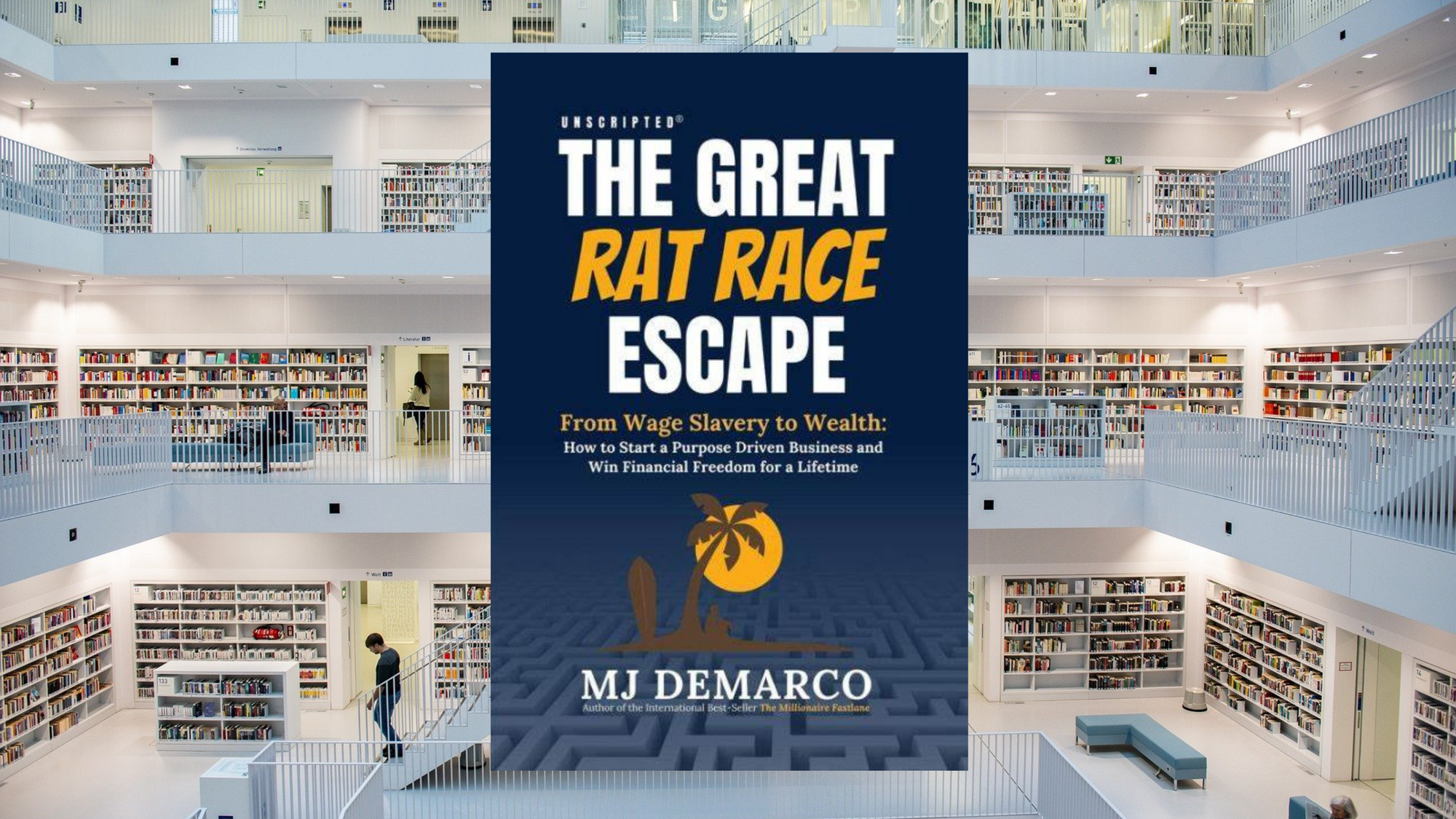
The Great Rat Race Escape, by MJ DeMarco:
The Great Rat Race Escape blasphemes against the current “economic religion” of the world, which tries to convince people that they “wouldn’t be too unhappy” working away for 40+ years at a job that they “kinda-sorta like” (or, in many cases, passionately loathe), just so they can maybe - hopefully - get their freedom back fifty years later when they can finally enjoy their money from the safety of the nursing home.
That sounds like a waste of a perfectly joyous life to me, and M.J. DeMarco teaches how we can avoid that fate by starting a business and taking advantage of the internet gold rush that we’re currently experiencing. The creator economy is absolutely booming right now, new businesses are appearing all the time, entrepreneurship is “hot,” and our time is now.
“If the crowd knew any better, they wouldn’t be two paychecks from broke and wasting their life in front of a television.”
“Live within your means with the intent to expand your means.”
“Anything that can be improved is a business opportunity.”
Read the Full Breakdown: The Great Rat Race Escape, by MJ DeMarco

The Millionaire Fastlane, by MJ DeMarco:
This is MJ's first book, which has sold over a million copies with essentially no ad budget. It was a pure, word-of-mouth phenomenon, as people's entire outlooks and perspectives were changed by his wealth and business principles, and people kept saying to their friends, "There's this book...you have to read it!"
I remember where I was when I first read it: broke, in debt, driving a car I could barely afford, making minimum wage as a security guard at a hospital. I was sitting in my car - going from one shitty job to go work at another for a few more hours - and I literally felt myself changing as I read it. I knew that this book was going to be one of the reasons why I was going to end up making it. And, well, it worked!
“Normal is not something you aspire to. It’s something you get away from.”
“For me, every day is Saturday because I haven’t sold off Monday through Friday.”
“Wheelchairs don’t fit in the trunks of Lamborghinis.”
This Book on Amazon: The Millionaire Fastlane, by MJ DeMarco

The Almanack of Naval Ravikant, by Eric Jorgenson:
Being rich and happy are learnable skills. One of the greatest lessons you'll learn from reading books like this one is that where you start off doesn't have to be where you end up. If there's a skill you lack, you can learn it; if there's a big scary problem looming over you, you can overcome it; if you want more out of life, you can have it.
One of the biggest takeaways from the book is the emphasis on leveraging specific skills - skills that you can't be trained for. If there's something that you can be trained for, someone else can be trained to replace you, so you have to cultivate specific, valuable, domain-specific knowledge if you want to be maximally rewarded in the marketplace.
“I was born poor and miserable. I’m now pretty well-off, and I’m very happy. I worked at those.”
"Let's get you rich first. I'm very practical about it because, you know, Buddha was a prince. He started off really rich, then got to go off in the woods."
"If you're a perpetual learning machine, you will never be out of options for how to make money. You can always see what's coming up in society, what the value is, where the demand is, and you can learn to come up to speed."
Read the Full Breakdown: The Almanack of Naval Ravikant, by Eric Jorgenson
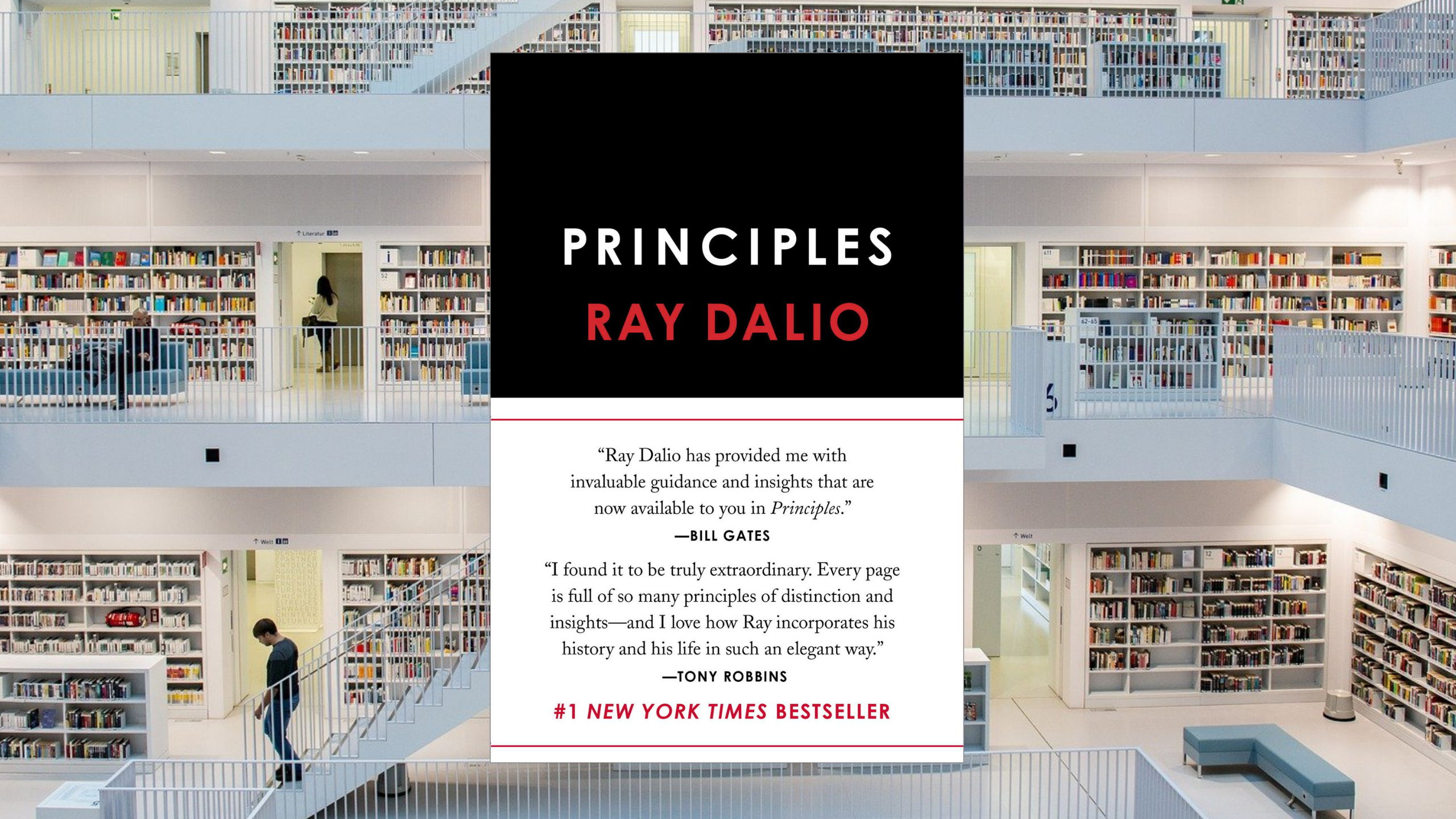
Principles, by Ray Dalio:
This is another amazingly helpful business book, written by the head of Bridgewater Associates, a hedge fund with more than $160 billion in assets under management. That alone gives Ray Dalio a ton of earned credibility, but what you'll learn in this book about decision-making, risk, business, and life itself is just spectacular!
"I believe that the key to success lies in knowing how to both strive for a lot and fail well. By failing well, I mean being able to experience painful failures that provide big learnings without failing badly enough to get knocked out of the game."
“Look for people who have lots of great questions. Smart people are the ones who ask the most thoughtful questions, as opposed to thinking they have all the answers. Great questions are a much better indicator of future success than great answers.”
“Every time you confront something painful, you are at a potentially important juncture in your life - you have the opportunity to choose healthy and painful truth or unhealthy but comfortable delusion.”
This Book on Amazon: Principles, by Ray Dalio

The View from the Opposition:
No one's ideas are beyond questioning. In this section, I argue the case for the opposition and raise some points that you might wish to evaluate for yourself while reading this book.
#1: Alex Becker Has a "Mixed" Reputation Online
When you become successful, a certain number of people are going to hate you for it no matter what, but in Alex Becker's case, he's probably brought on at least some of this hate himself.
I'd never recommend his book if I didn't think the information was exceptionally valuable (it is), but Alex Becker hasn't been able to shake his "sleazy marketer" rep, and unfortunately, it's due to the way he's run his businesses in the past.
Now, I think that he's matured and all that, but there's a history there that makes people distrust him, and I totally get that. Some customers have said that as soon as Becker moves on to another business, he pretty much ignores his customers in the previous business. I can't say for sure whether that's true or not, but there you have it.
His writing style also isn't for everyone either! I happen to like it, and it was just what I needed to hear when I first started out, but it can come off as abrasive or self-indulgent to some. I re-iterate, though, that the information is rock solid. Just some things to keep in mind!
#2: The Whole "Everything is Your Fault" Thing Can Be Taken Too Far
I firmly believe in taking full and complete responsibility for everything that happens in your life, but for some people, when they hear "Everything is your fault," they take that idea too far and it tips into self-loathing and persistent self-recrimination.
The point is not to beat yourself up for every little tiny mistake, or to think that "If only I were good enough, this wouldn't have happened," but to realize that we have much more control over our lives than we often acknowledge.
#3: The Slow Lane Might Just Get You There
I don't think there's anything "wrong" with going to school, getting a job, and working like a "normal person" for a few decades before retiring. You don't have to be an "entrepreneur" or feel pressured by all the Gary V-style hype motivation circulating around out there saying that you've somehow "failed" for not building a billion-dollar software company.
Plenty of people take the "slow lane" to wealth and end up with satisfying careers that enable them to live perfectly pleasant and memorable lives. Just be aware, however, that if wealth is your goal, a "regular" job is not likely to get you there. Even if you were to save $10,000 a year, it would take you literally a century to earn $1,000,000.
#4: Don't Forget to Be Happy
As I alluded to earlier, not everyone needs to be megawealthy and successful and all that in order to live a meaningful life. Indeed, life would still be worth living even if you didn't have any money at all!
It's perfectly acceptable to just hang out and be happy without building a successful business that makes you rich. The process of building a great business can itself become an incredible source of satisfaction and happiness, but it's not the only path. No matter what, you are enough, you can be happy, and life is always worth living.
"The test of a first-rate intelligence is the ability to hold two opposed ideas in the mind at the same time and still retain the ability to function.”
-F. Scott Fitzgerald

Action Steps:
So you've finished reading. What do you do now?
Reading for pleasure is great, and I wholeheartedly support it. However, when I'm reading for a particular purpose, I am intensely practical. I want a result. I want to take what I've learned and apply it to my one and only life to make it better!
Because that's really what the Great Books all say. They all say: "You must change your life!" So here, below, are some suggestions for how you can apply the wisdom found in this breakdown to improve your actual life.
Please commit to taking massive action on this immediately! Acting on what you've learned here today will also help you solidify it in your long-term memory. So there's a double benefit! Let's begin...
#1: Make the Decision to Become Wealthy
This is one of the most important things you'll ever do on your way to wealth. Everything starts with a decision, and once you've firmly decided, once and for all, that you're going to get this "wealth thing" handled, doors will open for you that had remained close to you before.
It's almost like the universe gets out of your way once you've chosen a definite path forward; or, better yet, circumstances conspire to help you achieve what you've absolutely determined that you're going to do. There's nothing "magical" about this, I don't think, but rather it's a feature of our physical universe. Boldness has genius and magic within it. So make a decision, right here and now, that you're going to become wealthy no matter what.
#2: Start Looking for Abundance
Evidence of abundance and wealth is everywhere around you, but you have to be looking for it. Look for evidence of people winning at life and business, and you'll find it.
So that's exactly what you should do: seek out evidence that other people have achieved what you want to achieve yourself, and remind yourself constantly that there is a virtually unlimited amount of money in the world.
The key distinction, though, is that money flows to people who are the most effective problem-solvers in our society. Look for signs of wealth and abundance, and you'll find that it's attached to people who fulfill a need in society and receive payment for doing so.
#3: Decide on the Opportunity You Wish to Pursue
When you're looking for problems that you can step in and solve by providing a service, you'll notice that the majority of problems and issues people have fall into one of three main areas: health, wealth, and relationships.
If you can help people become healthier, get richer, or have more satisfying and fulfilling relationships, there's no limit to the amount of money you can make. Books like The 10 Pillars of Wealth sell so many copies because a large number of people are interested in becoming wealthier. The Stairway to Wisdom is profitable because I help people find the best books and use the knowledge found there to improve their lives. See the pattern?
So go out and look for problems! Decide which areas - health, wealth, or relationships - you can help people improve in, and then decide on how you're going to package your services. Are you going to write a book? Are you going to provide health and fitness coaching? Marriage counseling? Something else?
#4: Map Out the Path to Your Goals
Once you've decided on your "vehicle," i.e. your business, now you have to map out exactly how you're going to achieve your business goals. There is a definite path to reaching $1,000,000 a year in profit, but it's not going to happen without a plan. And aiming for a million dollars right off the bat isn't even the best way to go about it, as we'll discuss in the next Action Step.
A good plan is to work backward from your goals until you get to exactly where you are now. It's entirely possible to make $1,000,000 in profit by the end of, say, Year 5, but at the end of Year 1, you may "only" be able to turn a $10,000 profit. No problem! Your 5-goal will be $1,000,000, your 1-year goal will be to make $10,000 in your new business, and your 6-month goal could be to make $1,000.
What you want to do here is go granular, and make the very next step something very, very small and doable. Your 5-year plan has to start somewhere, and that can simply be deciding which opportunity to pursue, figuring out where you're going to get your first customer, and planning exactly what you're going to say in order to get them to work with you.
#5: Take Massive Action on the Very Next Step
Now the only thing left to do is to take massive action on the very next smallest thing that is going to take you in the direction of your goals. You can break it down as small as it has to be so that it's not intimidating in the least, but you have to start somewhere, and you have to take action!
I'm talking seriously small actions here. As in, today, you're going to decide what website domain name you're going to pick. You don't even have to reserve the website name or anything - just pick a name! That's a very small step, but you've done it, and now you can move on to the next step.
Then tomorrow, maybe you can list what services you're going to offer. And the day after that you can write a short "About Me" page that you can show to potential clients to convince them to work with you.
None of those things are going to lead to a million dollars in profit tomorrow, but even just one tiny, meaningful action each and every day adds up to 365 meaningful actions a year, and that adds up to a lot. You may even find that you don't even need to make millions of dollars a year in order to hit your financial goals. As Alex Becker rightfully points out, it is very, very difficult to spend millions of dollars a year.


About the Author:
Alex Becker is an ultra-successful tech entrepreneur and the CEO of HYROS, an ad-tracking and analytics company that works with large e-commerce brands and celebrity influencers spending thousands of dollars on paid ads each month.
But way back in 2007, Alex started off as a firefighter in the US Air Force with about $6,000 to his name after he left active service. Since then, he has built multiple 7- and 8-figure companies from the ground up, without the help of any outside investors.
He's also built a YouTube presence of over 1.2 million subscribers and has more than 800,000 followers on Twitter, where he posts about crypto gaming and investing, business strategy, and entrepreneurship.
Additional Resources:
Alex Becker - Why I Live Like a Monk
Alex Becker - Key Thoughts Only the 0.001% Has
Alex Becker - Why (As a Millionaire) I Own NOTHING
This Book on Amazon:
The 10 Pillars of Wealth, by Alex Becker
If You Liked This Book:
The Millionaire Fastlane, by MJ DeMarco
The Great Rat Race Escape, by MJ DeMarco
The Almanack of Naval Ravikant, by Eric Jorgenson
The Psychology of Money, by Morgan Housel
Die with Zero, by Bill Perkins
The Richest Man in Babylon, by George Clason
Money: Master the Game, by Tony Robbins


